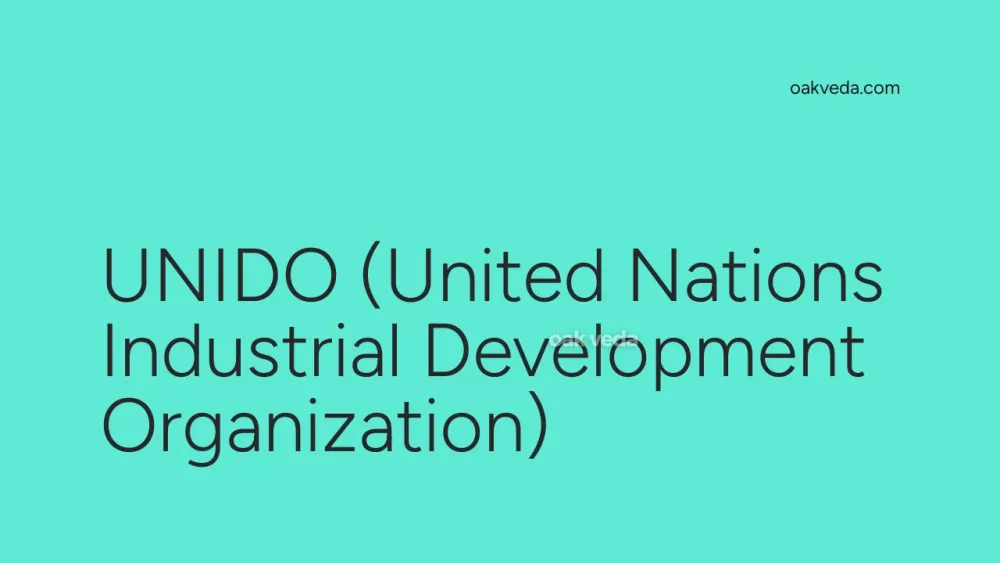
What is the Full Form of UNIDO?
UNIDO is the acronym for the United Nations Industrial Development Organization. This specialized agency of the United Nations plays a crucial role in promoting and accelerating sustainable industrial development worldwide.
What is United Nations Industrial Development Organization?
The United Nations Industrial Development Organization (UNIDO) is a specialized agency within the United Nations system. Its primary focus is on fostering inclusive and sustainable industrial development (ISID) in developing countries and economies in transition. UNIDO's mission is to help member states achieve their industrial development goals, reduce poverty, and integrate into the global economy.
Origin and Development of UNIDO
UNIDO was established in 1966 as a special organ of the United Nations General Assembly. However, it wasn't until 1985 that UNIDO became a fully-fledged specialized agency of the UN. This transformation marked a significant milestone in the organization's history, granting it more autonomy and resources to pursue its industrial development agenda.
The organization's mandate has evolved over the years, adapting to the changing global economic landscape and emerging challenges. Today, UNIDO's work is guided by the Lima Declaration, adopted in 2013, which emphasizes the importance of inclusive and sustainable industrial development.
How does UNIDO work?
UNIDO operates through a combination of technical cooperation, analytical and policy advisory services, and standard-setting activities. The organization works closely with governments, private sector entities, and other stakeholders to implement its programs and projects.
Key aspects of UNIDO's operations include:
- Technical Cooperation: Providing expertise and technology transfer to support industrial development projects.
- Policy Advice: Offering guidance on industrial policies and strategies to member states.
- Research and Analysis: Conducting studies on industrial trends and best practices.
- Partnerships: Collaborating with various international organizations, private sector entities, and academic institutions.
Functions of UNIDO
UNIDO's functions are diverse and encompass several critical areas of industrial development:
- Promoting Industrial Growth: Assisting countries in developing and implementing industrial policies and strategies.
- Enhancing Competitiveness: Helping industries, particularly SMEs, to improve their productivity and competitiveness.
- Fostering Innovation: Supporting the adoption of new technologies and innovative practices in industry.
- Encouraging Sustainability: Promoting environmentally friendly and resource-efficient industrial practices.
- Facilitating Trade: Assisting countries in meeting international standards and accessing global markets.
Applications of UNIDO
UNIDO's work has wide-ranging applications across various sectors and industries:
- Agro-industries: Enhancing agricultural productivity and food security through value chain development.
- Energy: Promoting renewable energy and energy efficiency in industrial processes.
- Environment: Supporting the adoption of cleaner production technologies and waste management practices.
- Trade Capacity-Building: Helping countries develop quality infrastructure and meet international standards.
- Gender Equality: Promoting women's empowerment and gender equality in industrial development.
Features of UNIDO
Several key features distinguish UNIDO's approach to industrial development:
- Inclusive Approach: Ensuring that industrial development benefits all segments of society.
- Sustainability Focus: Emphasizing environmentally friendly and resource-efficient industrial practices.
- Innovation-Driven: Promoting the adoption of new technologies and innovative solutions.
- Global Reach: Operating in over 60 countries worldwide.
- Partnerships: Collaborating with a wide range of stakeholders, including governments, private sector, and civil society.
Benefits of UNIDO
UNIDO's work brings numerous benefits to member states and the global community:
- Economic Growth: Stimulating industrial development leads to job creation and economic prosperity.
- Poverty Reduction: Inclusive industrial growth helps lift people out of poverty.
- Environmental Protection: Promoting sustainable industrial practices contributes to environmental conservation.
- Technology Transfer: Facilitating the adoption of advanced technologies in developing countries.
- Global Integration: Helping countries participate more effectively in global trade and value chains.
Limitations or Challenges of UNIDO
Despite its significant contributions, UNIDO faces several challenges:
- Resource Constraints: Limited funding can restrict the scope and scale of UNIDO's activities.
- Diverse Needs: Balancing the varied industrial development needs of different member states.
- Rapidly Changing Technology: Keeping pace with technological advancements in industry.
- Global Economic Uncertainties: Navigating the impacts of global economic fluctuations on industrial development.
Future Developments in UNIDO's Work
Looking ahead, UNIDO is focusing on several key areas for future development:
- Industry 4.0: Helping countries adapt to the Fourth Industrial Revolution.
- Circular Economy: Promoting circular economy principles in industrial processes.
- Digital Transformation: Supporting the digitalization of industries, especially SMEs.
- Green Industry: Advancing environmentally sustainable industrial practices.
- Post-Pandemic Recovery: Assisting countries in rebuilding their industrial sectors after the COVID-19 pandemic.
FAQs on UNIDO Full Form
-
What is UNIDO's main objective? UNIDO's primary objective is to promote and accelerate inclusive and sustainable industrial development in developing countries and economies in transition.
-
Where is UNIDO headquartered? UNIDO's headquarters is located in Vienna, Austria.
-
How many countries does UNIDO operate in? UNIDO has a presence in over 60 countries worldwide.
-
What is UNIDO's motto? UNIDO's motto is "Progress by Innovation."
-
When was UNIDO established? UNIDO was established in 1966 and became a specialized UN agency in 1985.
In conclusion, the United Nations Industrial Development Organization (UNIDO) plays a vital role in promoting sustainable and inclusive industrial development worldwide. Through its diverse functions and applications, UNIDO continues to support member states in achieving their industrial development goals, contributing to global economic growth, and advancing the United Nations Sustainable Development Goals.
You may be interested in:
- UML (Unified Modeling Language): Full Form Explained
- WMO (World Meteorological Organization)
- RTI (Right to Information): Full Form and Importance
- GDP (Gross Domestic Product): Full Form and Meaning
- UNO (United Nations Organization) Full Form
- NASDAQ (Full Form): National Association of Securities Dealers Automated Quotations

